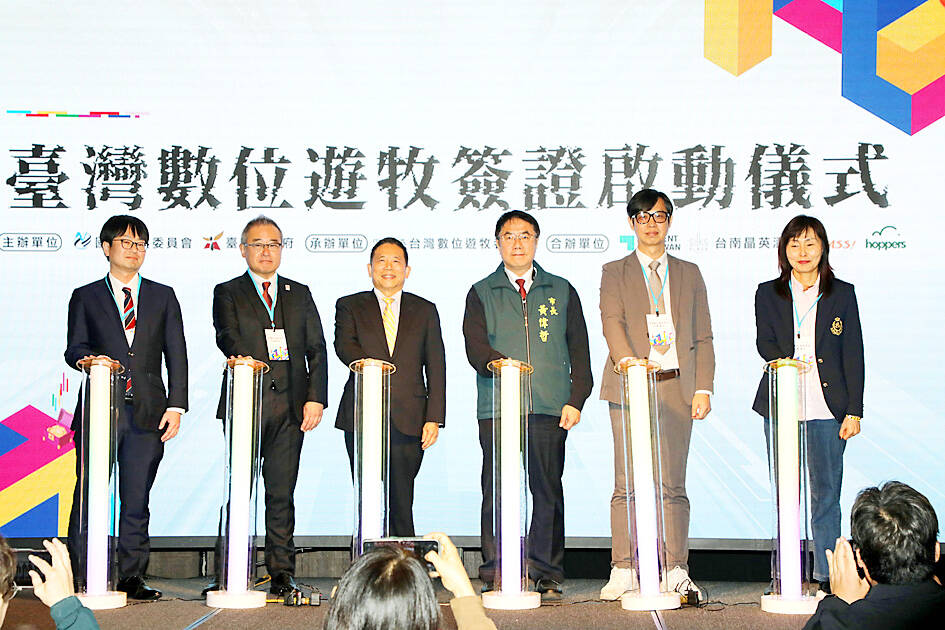Taiwan has launched a six-month “digital nomad visitor visa” program for foreign nationals from its list of visa-exempt countries who meet financial eligibility criteria and provide proof of work contracts.
To apply, foreign nationals must either provide proof that they have obtained a digital nomad visa issued by another country or demonstrate earnings based on age brackets, the Bureau of Consular Affairs said.
Applicants aged 20 to 29 must show they earned an annual salary of at least US$20,000 or its equivalent in one of the past two years, while those aged 30 or older must provide proof they earned US$40,000 in the same period.

Photo: CNA
Applicants must also provide “proof of bank deposits” averaging at least US$10,000 for the previous six-month period as well as “proof of health and full hospitalization insurance for the entire duration of stay,” the Ministry of Foreign Affairs said.
Only nationals from the ministry’s list of visa-exempt countries are eligible for the new visa, which includes citizens of Australia, Canada, Israel, Japan, New Zealand, South Korea, the UK, the US and several EU countries, including France and Germany.
Applicants must also provide a “personal resume or portfolio, including academic background and work experience,” a valid work contract from an employer or contracts for current freelance projects, and complete a “description of intended activities” form.
The new visa was launched on Wednesday last week by the National Development Council (NDC) in conjunction with the ministry, apparently in an attempt to attract financially independent foreign nationals to spend overseas-earned money in Taiwan.
The NDC in July last year said that it hoped to attract 100,000 “digital nomads” — referring to people who work remotely, sometimes for a company in one country while living in another.
However, nearly a week after applications were first opened, neither the NDC nor the ministry announced or promoted the new visa category on their Web sites in any language.
It is also unclear how the digital nomad visitor visa might differ practically from other visitor visas already offered to people from countries on the ministry’s visa-exemption list, except for offering a longer stay of up to six months.
Foreign nationals from the majority of Taiwan’s visa-exempt countries can already visit Taiwan for 90 days without providing proof of income, while British and Canadian nationals can extend their three-month stay to six months in total, the Bureau of Consular Affairs’ Web site says.

Intelligence agents have recorded 510,000 instances of “controversial information” being spread online by the Chinese Communist Party (CCP) so far this year, the National Security Bureau (NSB) said in a report yesterday, as it warned of artificial intelligence (AI) being employed to generate destabilizing misinformation. The bureau submitted a written report to the Legislative Yuan in preparation for National Security Bureau Director-General Tsai Ming-yen’s (蔡明彥) appearance before the Foreign Affairs and National Defense Committee today. The CCP has been using cognitive warfare to divide Taiwanese society by commenting on controversial issues such as Taiwan Semiconductor Manufacturing Co’s (TSMC, 台積電) investments in the

HELPING HAND: The steering committee of the National Stabilization Fund is expected to hold a meeting to discuss how and when to utilize the fund to help buffer the sell-off The TAIEX plunged 2,065.87 points, or 9.7 percent, to close at 19,232.35 yesterday, the highest single-day percentage loss on record, as investors braced for US President Donald Trump’s tariffs after an extended holiday weekend. Amid the pessimistic atmosphere, 945 listed companies led by large-cap stocks — including Taiwan Semiconductor Manufacturing Co (TSMC, 台積電), Hon Hai Precision Industry Co (鴻海精密) and Largan Precision Co (大立光) — fell by the daily maximum of 10 percent at the close, Taiwan Stock Exchange data showed. The number of listed companies ending limit-down set a new record, the exchange said. The TAIEX plunged by daily maxiumu in just

‘COMPREHENSIVE PLAN’: Lin Chia-lung said that the government was ready to talk about a variety of issues, including investment in and purchases from the US The National Stabilization Fund (NSF) yesterday announced that it would step in to staunch stock market losses for the ninth time in the nation’s history. An NSF board meeting, originally scheduled for Monday next week, was moved to yesterday after stocks plummeted in the wake of US President Donald Trump’s announcement of 32 percent tariffs on Taiwan on Wednesday last week. Board members voted to support the stock market with the NT$500 billion (US$15.15 billion) fund, with injections of funds to begin as soon as today. The NSF in 2000 injected NT$120 billion to stabilize stocks, the most ever. The lowest amount it

INVESTIGATION: The case is the latest instance of a DPP figure being implicated in an espionage network accused of allegedly leaking information to Chinese intelligence Democratic Progressive Party (DPP) member Ho Jen-chieh (何仁傑) was detained and held incommunicado yesterday on suspicion of spying for China during his tenure as assistant to then-minister of foreign affairs Joseph Wu (吳釗燮). The Taipei District Prosecutors’ Office said Ho was implicated during its investigation into alleged spying activities by former Presidential Office consultant Wu Shang-yu (吳尚雨). Prosecutors said there is reason to believe Ho breached the National Security Act (國家安全法) by leaking classified Ministry of Foreign Affairs information to Chinese intelligence. Following interrogation, prosecutors petitioned the Taipei District Court to detain Ho, citing concerns over potential collusion or tampering of evidence. The